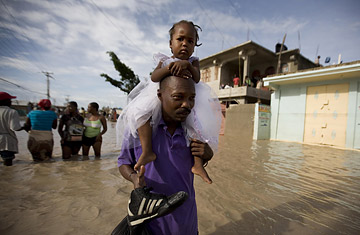
A man carries a girl on his shoulders as he wades through a flooded street in Gonaives, Haiti, Monday, Sept. 8, 2008. Four storms have killed more than 300 people in Haiti in less than a month.
The media profile of this season's hurricanes grows with their proximity to the U.S. mainland, but by the time they reach American soil they often have already delivered their harshest punishments — on those least able to cope. When Faye and Gustav hit Haiti last month, the poorest country in the Western hemisphere began searching for a humanitarian lifeline. Then came Hanna, dumping more than nine feet of water on Gonaives, the resource-starved country's second largest city. Last week, Ike delivered the knockout blow, swallowing the bridges and roads that provided humanitarian access to the worst-hit areas. Eight of the country's 10 geographic departments have been flooded, hundreds of Haitians are dead, tens of thousands are homeless, and hundreds of thousands are cut off from humanitarian aid.
Haitian President Rene Preval could not have done anything to head off the devastation, but he could have eased what will be the country's most extensive recovery process. According to the U.S. Southern Command, which is responsible for security operations in Central and South American and the Caribbean, funding was approved two years ago for an Emergency Operations Center (EOC) and last year for a Disaster Relief Warehouse (DRW) in Haiti's capital, Port-au-Prince. Those projects are at a standstill, however, because the Haitian government has not granted Southcom title to the land on which it which the $906,000 facilities are to be built. A contractor for the EOC has been chosen, and money earmarked to equip the DRW with shelving, pallet jacks, forklifts, a database. "But without the land title we can't commit the resources," said Southcom Colonel William Costello "It's like buying furniture before you build the house."
Southcom has built many such centers throughout the Caribbean. When Gustav hit Jamaica last month, that country needed little outside assistance because it already had two DRWs and an EOC in place. Had President Preval prioritized Southcom's proposal, Haiti could be pulling cots, blankets, food and water from its own warehouse instead of relying on the U.S.S Kearsarge, the International Red Cross, the United Nations and others. (See photos of Hurricane Gustav here).
As things stand, it may be days before anyone can evacuate citizens, get food and water distributed nationally, and remove bloated bodies. The country is no better equipped today than it was four years ago when Tropical Storm Jeanne killed more than 3,000 and displaced more than 200,000. CARE alone removed 114,000 metric tons of debris and mud from that storm, and distributed 2,200 tons of food and 110,000 half-liter bags of water. The damage from this year's storms is much more severe.
Haiti's political instability has imperiled efforts at disaster preparation. The revolving door of governments in the last 20 years continued five months ago when riots sparked by rising food and fuel prices toppled the most recent incumbents; it was only last week that parliament ratified Michele Duvivier Pierre-Louis as Prime Minister. Her first order of business will be humanitarian relief. Two months ago the Family Early Warning Systems Network (composed of USAID, the European Union, FAO and the World Food Program) predicted that nearly half of Haiti's population — or some 4 million people — could face a food crisis by December. And that was before the deluge that flooded the country's breadbasket. (See photos of Haiti Under Fire here.)
Pierre-Louis will be required to show extraordinary leadership skills if she is to turn a divided congress into a proactive and effective vehicle for crisis management. And she faces the challenge of rooting out the endemic corruption that gives pause to donor governments considering aid to Haiti. "If Pierre-Louis can attack corruption, she might be able to get far more assistance," said Haitian analyst Jocelyn McCalla, president of JMC Strategies, "and be more effective than her predecessors."
But she inherits the reins of power amid a catastrophic situation in which hundreds more people could die within the next few weeks, and possibly thousands more. There are, after all, still more than 11 weeks left of the hurricane season.
